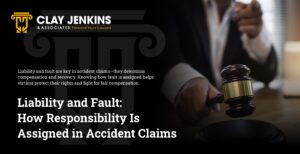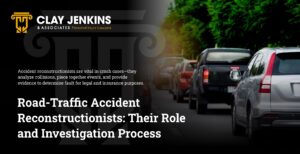
Liability and fault determination shapes the foundation of every accident claim, influencing compensation outcomes and recovery success. Understanding how responsibility gets assigned in accident claims empowers victims to protect their rights and pursue fair compensation for their injuries and damages.
What Is Liability In Accident Claims?
Liability in accident claims represents the legal responsibility one party bears for causing harm or damages to another person. This fundamental concept establishes who must compensate victims for their injuries, property damage, medical expenses, and other losses resulting from the incident.
For a free legal consultation, call (972) 938-1234
How Is Fault Determined?
Fault determination involves comprehensive analysis of evidence, circumstances, and applicable Texas laws to establish which party caused the accident. Courts and insurance companies examine driver actions, traffic violations, road conditions, and witness accounts to assign responsibility accurately under Texas modified comparative negligence rules.
Modified Comparative Negligence In Texas
Modified comparative negligence in Texas allows accident victims to recover damages only if their fault percentage remains below 51 percent. This system reduces compensation proportionally to the victim’s responsibility level, but completely bars recovery if they bear majority fault for the collision. Texas follows the 51 percent rule, meaning victims can pursue damages when they’re 50 percent or less at fault, making fault determination crucial for successful claims.
Role Of Evidence In Establishing Fault
Evidence plays a crucial role in establishing fault by providing objective documentation of accident circumstances and party actions. Strong evidence collection significantly impacts fault determination and influences settlement negotiations or court decisions.
Police Reports And Their Significance
Police reports provide official documentation of accident details, officer observations, and preliminary fault assessments. These reports carry substantial weight with insurance companies and courts, though they don’t constitute final fault determination.
Witness Statements And Their Impact
Witness statements offer independent perspectives on accident events, corroborating or contradicting involved parties’ accounts. Credible witness testimony can substantially influence fault determination, particularly in disputed liability cases.
Photos And Videos As Undeniable Evidence
Photos and videos capture accident scenes, vehicle positions, damage patterns, and road conditions with objective clarity. This visual evidence often proves instrumental in reconstructing accident sequences and establishing fault with compelling accuracy.
Click to contact our personal injury lawyers today
Insurance Companies And Fault Assessment
Insurance companies conduct thorough fault assessments to determine claim liability and settlement obligations. Their investigations involve multiple evaluation methods to establish responsibility and minimize payout exposure.
Analyzing Policyholder Statements
Insurance adjusters carefully analyze policyholder statements for inconsistencies, admissions of fault, and factual accuracy. These statements significantly influence fault determination and can impact coverage decisions or settlement offers.
Conducting Damage Assessments
Damage assessments reveal impact patterns, collision forces, and accident dynamics through vehicle examination. Professional assessors use this physical evidence to reconstruct accident sequences and support fault determinations.
Consulting Professional Opinions
Insurance companies frequently consult accident reconstruction professionals, medical practitioners, and engineering consultants to strengthen their fault assessments. These professional opinions provide technical analysis supporting their liability conclusions.
Complete a Free Case Evaluation form now
Consequences Of Fault Assignment
Fault assignment carries significant consequences for all parties involved, determining financial responsibilities and potential damages. Understanding these implications helps accident victims prepare for potential outcomes and make informed decisions about their claims.
Financial Compensation Responsibilities
At-fault parties bear financial responsibility for victim damages, including medical expenses, lost wages, property damage, and pain and suffering. These compensation amounts can reach substantial figures depending on injury severity and economic losses.
Potential Actions Against The At-Fault Party
Victims can pursue various actions against at-fault parties, including insurance claims, personal injury lawsuits, and property damage recovery. These actions seek to restore victims to their pre-accident financial position through appropriate compensation.
Protecting Oneself After An Accident
Protecting oneself after an accident requires immediate action and strategic decision-making to preserve rights and strengthen potential claims. Proper post-accident procedures can significantly impact fault determination and compensation recovery.
Immediate Steps Post-Accident
Taking immediate steps post-accident includes ensuring safety, calling emergency services, and beginning evidence collection. These crucial first moments often determine the strength of subsequent insurance claims or litigation efforts. The Texas Department of Transportation emphasizes that proper accident response procedures significantly reduce complications in fault determination and claims processing.
Securing The Scene
Securing the scene involves moving vehicles to safety when possible, activating hazard lights, and establishing warning signals for other drivers. Proper scene management prevents additional accidents and preserves evidence integrity.
Exchanging Information
Information exchange requires collecting contact details, insurance information, and vehicle data from all involved parties. Thorough documentation during this exchange supports accurate claim processing and fault determination.
Seeking Medical Attention
Medical attention should be sought promptly even for seemingly minor injuries, as some conditions manifest symptoms hours or days later. Medical records establish injury causation links and document treatment needs for compensation purposes.
Importance Of Hiring a Car Accident Attorney
Professional legal representation provides crucial advocacy during fault disputes, insurance negotiations, and potential litigation. Skilled car accident attorneys understand fault determination processes and work diligently to protect client interests throughout the claims process.
Addressing Disputed Claims
Disputed claims require strategic approaches involving evidence presentation, witness coordination, and professional testimony. Experienced attorneys develop comprehensive case strategies to overcome fault disputes and secure favorable outcomes.
Maximizing Compensation Recovery
Compensation recovery maximization involves identifying all available damages, calculating future losses, and pursuing full value settlements. Thorough case preparation and skillful negotiation techniques help victims recover maximum compensation for their losses.
We’re On Your Side – Call Now For A 100% Free Consultation!
Don’t let insurance companies minimize your claim or shift fault unfairly onto you. The experienced auto accident attorneys at Clay Jenkins & Associates understand Texas fault laws and fight tirelessly to protect your rights. We’ve successfully handled thousands of car accident cases, securing maximum compensation for our clients’ injuries and damages.
Schedule your free consultation today with an auto accident lawyer at Clay Jenkins & Associates in Texas. We work on a contingency fee basis, meaning you pay nothing unless we win your case. Call now to discuss your accident claim and learn how we can help you recover the compensation you deserve.
Call or text (972) 938-1234 or complete a Free Case Evaluation form




